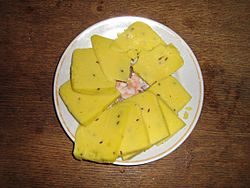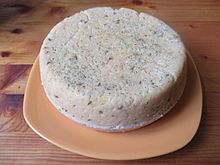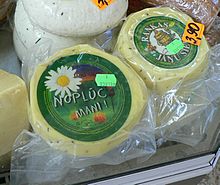Jāņi cheese facts for kids
Quick facts for kids Jāņi cheese |
|
|---|---|

Slices of Jāņi cheese
|
|
| Other names | Caraway cheese (ķimeņu siers) |
| Country of origin | Latvia |
| Source of milk | cows |
| Texture | soft, compact, slightly grainy and homogeneous throughout |
| Fat content | <30% |
| Dimensions | cylinder 4–6 cm in height and 8–30 cm in diameter |
| Aging time | at least 1–2 hours |
| Certification | TSG 2015 |
Jāņi cheese (Latvian: Jāņu siers) is a special Latvian cheese. It is made from sour milk. This cheese is traditionally eaten during Jāņi, which is Latvia's celebration of the summer solstice. The summer solstice is the longest day of the year.
Today, Jāņi cheese has become a very important symbol of Latvian culture. It represents traditions and celebrations. In 2021, reports showed that Jāņi cheese was becoming less popular. This was partly due to the COVID-19 pandemic. People also started choosing other cheeses more often. These included mozzarella, feta, and other hard cheeses.
How Jāņi Cheese is Made
Making Jāņi cheese starts with simple ingredients. The main parts are curd from soured milk and fresh milk. To give it its unique taste, people traditionally add caraway seeds, salt, and eggs. Sometimes, butter or cream is added to make the cheese richer.
The process begins by heating whole milk. Then, curd is added to the warm milk. This mixture is cooked until fluffy curds separate from a clear liquid. This clear liquid is called whey. The whey is removed when the cheese mixture reaches a temperature of about 72 to 77 degrees Celsius.
Next, the curds are put into a pan. A mix of egg, butter, salt, and caraway seeds is stirred in. The mixture is cooked until it forms a solid, firm ball. This cheese ball is then placed in a cheesecloth. It is often pressed down with weight to drain out any extra liquid. Jāņi cheese is usually made a few days before it is eaten. It needs to ripen in a cool place to get its best flavor.
A Special Cheese: EU Certification
On November 16, 2015, Jāņi cheese received a special honor. It was added to the EU Traditional Speciality Guaranteed (TSG) register. This means it has a protected name: Jāņu siers. The TSG label helps protect traditional foods. It ensures they are made using traditional methods.
Only certain manufacturers can use the Jāņu siers name. Currently, five companies meet the TSG rules. These are "Valmieras piens", "Rankas piens", "Lazdonas piensaimnieks", "Straupe", and "Dundaga". They can proudly label their product as Jāņu siers.
See also
 In Spanish: Jāņi (queso) para niños
In Spanish: Jāņi (queso) para niños
 | Laphonza Butler |
 | Daisy Bates |
 | Elizabeth Piper Ensley |



